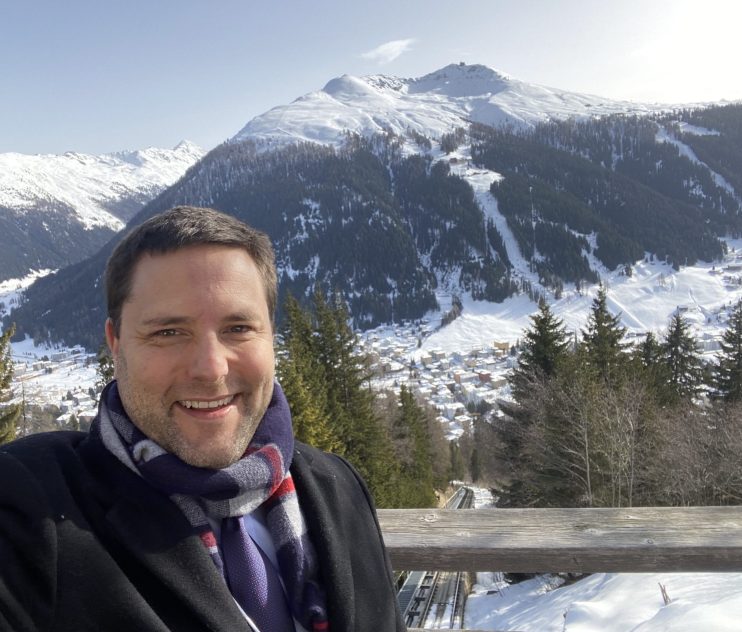Davos Diary: Day 5

So here I am, on the final day of the 2020 World Economic Forum. It seems a lifetime ago that I woke up early on Monday morning, the Alpine air fresh in my nostrils and excited for the week ahead. Since then, it’s been a whirlwind of heavyweights, celebrities, insights and networks: Thunberg, Trump, Charles, Ivanka, Imran Khan, Sajid Javid, Steve Mnuchin… all of it topped out by a message from the Pope. If I were an autograph collector, I’d have needed a new book.
The main event was a farewell buffet lunch at the Schatzalp, the so-called “Magic Mountain” of Thomas Mann fame, with its Art Nouveau panoramic restaurant. I tried to take in the scenery, which is truly spectacular, but my focus was chiefly inwards, saying goodbye to old friends and reinforcing my acquaintance with new contacts.
This might sound self-indulgent but it’s really not; when you get to this level of business and global interaction you come to understand that the personal touch is everything. The handshake, the warm glance of recognition, the passing word of greeting—it all matters. It’s what helps you bridge the gap from going through the motions to forging a meaningful connection, and, while it may be unquantifiable, it really makes a difference.
I’ve been thinking a lot today about Davos, and how the Forum works. It’s really not what you would expect. It’s so far from the caricature of the powerful and well-heeled slapping each other on the back so hard that it takes the breath away. For the participants, Davos is a place for confronting uncomfortable facts of life, and if a good view and a glass of champagne soothe that process slightly, then I’m not going to judge.
“A harmful truth is better than a useful lie,” Mann said. It could be the Forum’s motto. No-one invited Greta Thunberg expecting her to tell the assembled politicians, financiers and entrepreneurs, “You’re doing great: I’m proud of you.” Nor was the Prince of Wales any less blunt, in his own way. Now is the time, he told us, and posterity will judge us if we stand idle.
What have I learned? The so-called global elite get it. They really do. Only a few outliers—perhaps, admittedly, including the President of the United States—really doubt the scale or the immediacy of the crisis which environmental change presents. Everyone understands that we must change, that the way we have conducted ourselves over the past 50 or 100 years is simply unsupportable. We have raped the world of large proportions of its mineral wealth, and we cannot undo that. What we can do, as individuals, as leaders and as societies, is take stock, assess the damage with a realistic eye, and devise new behaviours which will first stem then perhaps even begin to reverse the tide of disaster.
But, as Doctor Faustus understood, the Devil is truly in the detail. If we agree on the ‘what’, and are forging a consensus around the ‘when’, the ‘how’ remains hotly contested. Of course we must strive to be greener, more environmentally friendly, but it is worth acknowledging that this cannot be at the cost of the opportunity for the developing world to grow and strengthen its economies. That would be the First World pulling the ladder up behind it, with grave and grim consequences.
The world is like a family. We are tied by bonds of closeness, history and affection which can survive almost anything. But we must talk. We must share our thoughts, cooperate and engage in dialogue which brings understanding of each other’s priorities but also a shared sense of purpose. If the climate crisis which so many are dreading comes to pass, it will not stop at the shores of Africa or the Far East. The fate of one is the fate of all: that’s how the global community works.
I end my week sobered by the scale of the task, but heartened by the infinite capacity of the human spirit. We have to believe the challenges we face are surmountable, otherwise what’s the point? But I genuinely feel that the people I’ve met, listened to, and talked to this week high above the world are willing to put their shoulders to the wheel. I’ll be honest: Davos isn’t perfect. But until you can present an alternative, the World Economic Forum does an outstanding job in fostering dialogue and encouraging cooperation. It’s a good start to the 2020s.